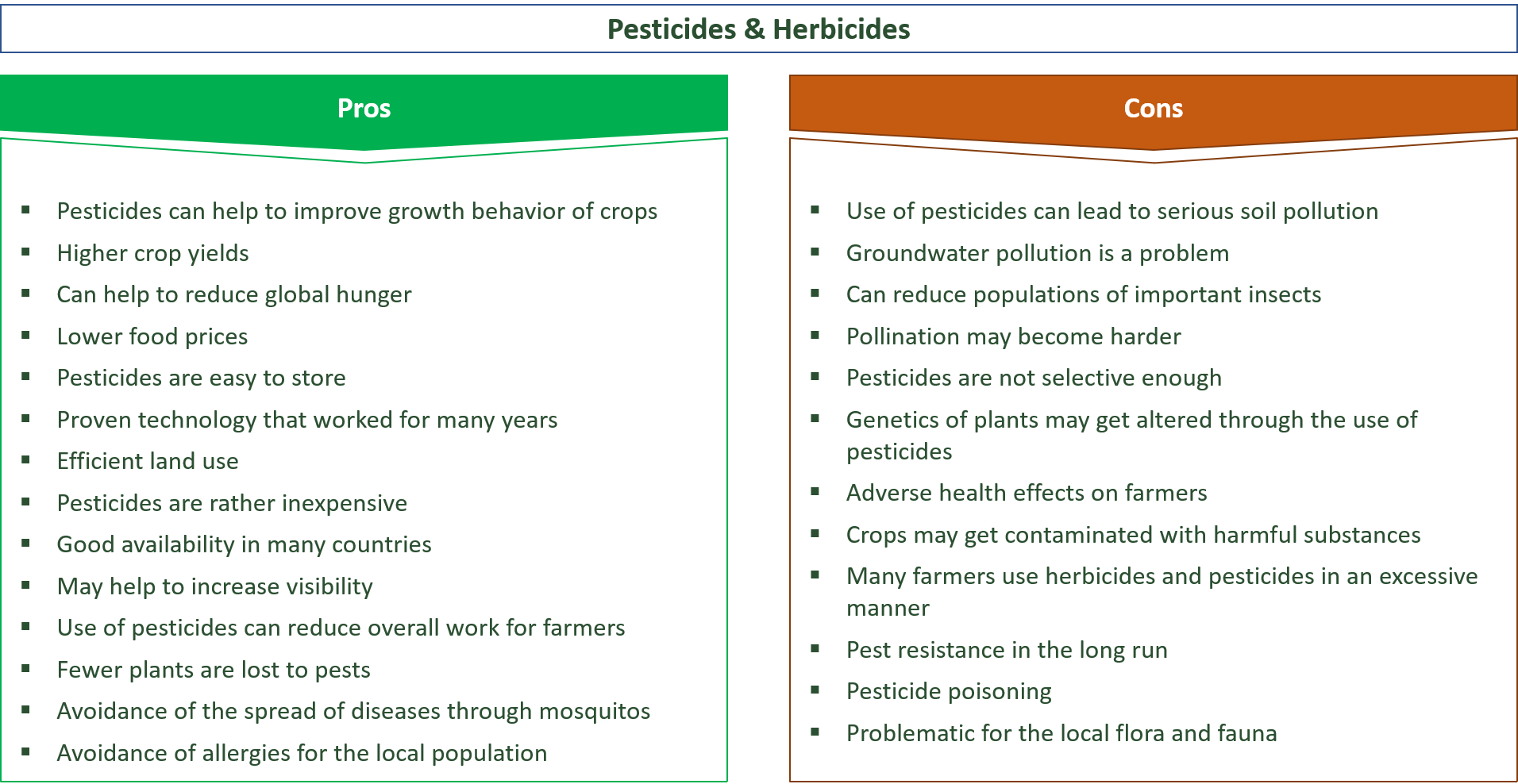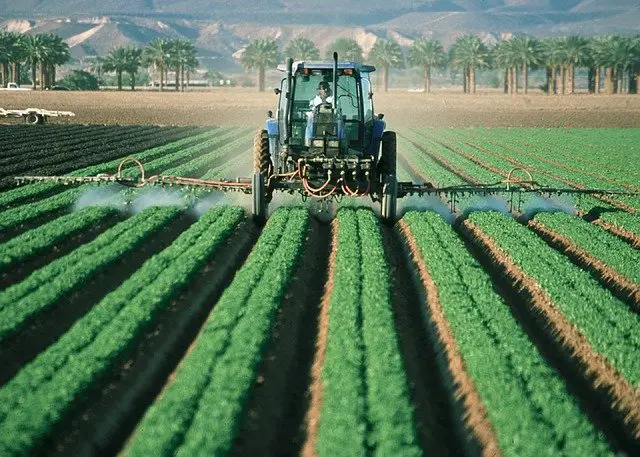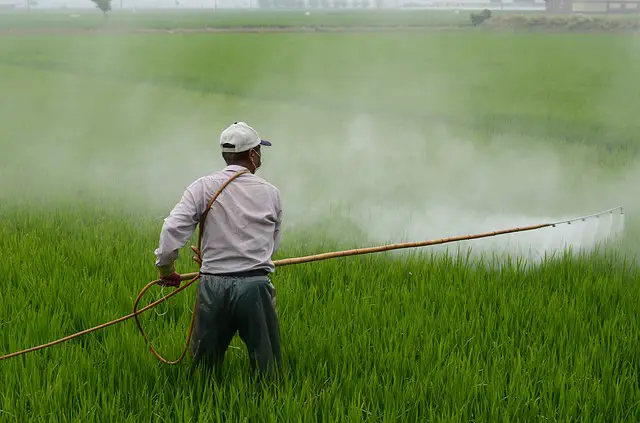“It’s important to concede that modern pesticides have helped to make farming more productive and to increase yields.”
Chuck Norris, Actor
Pros and Cons of Pesticides & Herbicides

The use of pesticides and herbicides has become quite popular over the past decades.
Farmers use excessive amounts of those substances in order to protect their crops and to maximize profits.
However, pesticides are not only used by farmers, but also by private persons in their gardens.
While the use of herbicides and pesticides can have many advantages, there are also some problems related to those substances.
In this article, the pros and cons of pesticides and herbicides are examined.
Audio Lesson
Contents
Advantages of Pesticides and Herbicides
- Pesticides can help to improve growth behavior of crops
- Higher crop yields
- Can help to reduce global hunger
- Lower food prices
- Pesticides are easy to store
- Proven technology that worked for many years
- Efficient land use
- Pesticides are rather inexpensive
- Good availability in many countries
- May help to increase visibility
- Use of pesticides can reduce overall work for farmers
- Fewer plants are lost to pests
- Avoidance of the spread of diseases through mosquitos
- Avoidance of allergies for the local population
- Protection against parasites
- Use of pesticides may increase overall life expectancy of people
Pesticides can help to improve growth behavior of crops
One important advantage of pesticide us is that it can help to improve the overall growth behavior of plants.
If plants get attacked by different sorts of pests, those plants have to defend against those pests, which costs them plenty of energy.
In turn, those plants will no longer grow in an optimal manner.
However, through using pesticides, the plants have to do less work on their own since pesticides will do the work for them.
Therefore, plants will have more energy to grow in a proper manner compared to a state without pesticide and herbicide use.
Higher crop yields
Since plants will have more energy to grow through the use of pesticides, also the crop yields tend to be significantly higher.
The bigger the plant, the more crops it can produce in many cases.
Also, fewer crops will be lost due to pests, which will further increase the crop yields of farmers.
Hence, in order to maximize crop yields in the short run, the use of pesticides and herbicides is crucial since it can support plants to resist pests in an effective manner.
Can help to reduce global hunger
Higher crop yields also imply that the local population can be supplied with more vegetables and fruits.
In many countries, especially in poor developing countries in the Southern hemisphere of our planet, the local population still heavily relies on the yields of local farmers in order to ensure their food supply.
Therefore, it is crucial that farmers produce as many crops as possible so that the local population gets enough food to survive.
Consequently, the use of pesticides can also be crucial to reduce the global hunger problem in many poor parts of our planet.
Lower food prices
The prices for goods are often determined by supply and demand.
Hence, if higher crop yields can be produced through the use of pesticides in agricultural processes, also the supply of food will increase.
In turn, this can lead to significantly lower food prices, which can greatly benefit the local population since they will have to spend less money on food and may be able to spend more money on education for their kids in order to provide them better chances to get out of poverty.
Moreover, if foods can be produced at lower prices, also export prices might be lower and those countries may be able to improve their competitiveness in the global food market.
Pesticides are easy to store
Another benefit of pesticides and herbicides is that they are also quite easy to store.
If they are packaged in a proper manner and stored under the right conditions, those pesticides can be stored for many years and will still be working in an efficient way.
Therefore, farmers can buy large amounts of pesticides and herbicides at a low price, store them and can use those substances for many years to come.
Proven technology that worked for many years
Pesticides have been used for many decades.
We know that the use of pesticides is a proven technology and that it works properly.
Hence, many farmers also learned to use pesticides from an early age on and simply do not want to refuse from the use of pesticides anymore since they know that they are working in the desired manner.
Thus, many farmers all over the world rely on pesticides in order to maximize crop yields and there is simply no suitable alternative yet which would have similar positive effects.
Efficient land use
Since our world population is growing and we might even exceed the 10 billion people mark until the end of the 21st century, it is also crucial that we use our land as efficiently as possible in order to be able to feed all those people.
Hence, the use of pesticides and fertilizers is also crucial in this regard since crop yields can be maximized and we can provide food for many people on a global scale, at least in the short run.
Pesticides are rather inexpensive
Another upside of pesticides is that they are also rather inexpensive.
Due to our technological progress, chemical pesticides and herbicides can be produced in large quantities at a quite low price.
This makes the use of pesticides quite tempting since farmers don’t have to invest large amounts of money, but could still significantly improve their crop yields.
Therefore, pesticides are also quite economical and can be a major tool to maximize the profits of farmers.
Good availability in many countries
Since pesticides are quite easy and cost-efficient to produce, they are also available in most countries of our planet.
Therefore, many farmers all over the world will have access to large amounts of pesticides and herbicides right when they need them a lack of those substances is quite unlikely.
Thus, pesticides are also quite reliable substances in the sense that the supply of those substances can be ensured on a large scale in most parts of our planet.
May help to increase visibility
Herbicides are not only helpful for agricultural purposes, they can also help to avoid the spread of plants which could potentially lead to traffic accidents in the long run.
For instance, many weeds grow beside our streets.
Some of them would grow to a significant size over time, which could potentially lower the visibility on our streets and in turn could lead to accidents.
Hence, it is crucial to prevent the further growth of those weeds by using herbicides in order to ensure the best visibility possible for drivers.
Use of pesticides can reduce overall work for farmers
Farming can also be quite exhausting.
Farmers often have to put in plenty of manual work and have to work long hours in order to maximize their crop yields and to be able to feed their families.
In order to reduce the amount of manual work for farmers, using pesticides and herbicides can be a great way to do so since pests and weeds can be removed on a large scale and farmers do no longer have to remove unwanted weeds with their hands.
Therefore, the use of those substances can make farming much more convenient and farmers would have much more time to spend with their families or on other things they like.
Fewer plants are lost to pests
Every year, numerous plants are also lost due to the spread of pests.
In turn, this can greatly harm the overall crop yields of farmers and may also imply serious adverse effects for the local population since they will often struggle from serious hunger due to that.
Hence, it is crucial to protect plants from pests as best as possible and the use of reasonable amounts of pesticides is one of the easiest and most efficient ways to achieve this goal.
Avoidance of the spread of diseases through mosquitos
Pesticides are not only useful to reduce the problem of plant pests, they are also crucial to prevent serious diseases to spread across the general public.
For instance, pesticides are important to reduce mosquito populations.
Those mosquitos could infect people with serious diseases like malaria or dengue fever.
Hence, in order to protect the general public from those diseases, it is crucial to use pesticides to lower mosquito populations.
Avoidance of allergies for the local population
Some people are also allergic to pests of several sorts.
Thus, in order to protect those people from unpleasant health conditions, it can also make sense to use pesticides to reduce many different sorts of pests.
Protection against parasites
In some areas of our planet, also parasites are a big problem, which can cause serious adverse health effects for the local population.
Hence, in order to protect the general public against health issues caused by parasites, pesticides can also help in this regard.
Use of pesticides may increase overall life expectancy of people
Pesticides can also help to increase the overall life expectancy of people in many countries all over the world.
Since crop yields will be higher due to the use of pesticides and herbicides, people will have more food and their immune system will also become stronger, which in turn will make those people less vulnerable to diseases.
Moreover, since the use of pesticides can reduce the populations of mosquitos and parasites, fewer people would suffer from serious health conditions.
In turn, the overall life expectancy could be increased significantly through the use of reasonable amounts of pesticides and herbicides.

Disadvantages of Herbicide and Pesticide Use
- Use of pesticides can lead to serious soil pollution
- Groundwater pollution is a problem
- Can reduce populations of important insects
- Pollination may become harder
- Pesticides are not selective enough
- Genetics of plants may get altered through the use of pesticides
- Adverse health effects on farmers
- Crops may get contaminated with harmful substances
- Many farmers use herbicides and pesticides in an excessive manner
- Pest resistance in the long run
- Pesticide poisoning
- Problematic for the local flora and fauna
- Ecological imbalance
- Rather unclear long-term effects
Use of pesticides can lead to serious soil pollution
Apart from the numerous important benefits of pesticides, there are still many problems related to the use of these substances.
For instance, one problem of pesticides is that they can lead to serious soil pollution.
Over time, significant amounts of harmful elements will end up in the soil, which can be detrimental for many useful microorganisms populating the soil.
Moreover, also the structure as well as the acidity level of the soil will become altered over time.
In the long run, the soil may become less fertile and may even no longer be suitable for agricultural purposes in the future.
Hence, using excessive amounts of pesticides can be detrimental in the long run and farmers should only use reasonable amounts of those substances in order to make farming more sustainable.
Groundwater pollution is a problem
If excessive amounts of harmful chemicals related to pesticide use end up in the soil, those chemicals will also be washed into our groundwater sooner or later.
In turn, this can lead to serious groundwater pollution.
Many people still don’t value our water too much since it is so cheap and it is available in large quantities in our supermarkets.
Yet, due to global warming and pollution, water will become a quite scarce resource in the future and we as humanity should take efforts to protect our groundwater as best as possible.
Hence, the excessive use of pesticides is also a major problem in the context of groundwater protection and farmers all over the world should therefore reduce the use of pesticides in order to protect the groundwater.
Can reduce populations of important insects
The use of pesticides can also lead to a reduction in the population of many important insects.
For instance, pesticides are known to reduce the number of bees and butterflies on a large scale.
In turn, this can have several adverse consequences for the local ecosystem.
Hence, in order to protect those insects, pesticides should not be used on a large scale.
Pollination may become harder
If the number of helpful insects like bees is reduced through the use of pesticides in agriculture, chances are that also the pollination of plants will become much harder.
If enough of those insects are present, farmers often do not have to worry about the pollination of their plants at all since bees and other insects fly from one plant to the other in order to collect pollen.
In turn, the plants will become pollinated in a completely natural manner.
However, if those insects are no longer present in large numbers due to the use of excessive amounts of pesticides, they can no longer pollinate the plants, which can lead to serious problems for farmers since their crop yields may become much lower due to that.
Pesticides are not selective enough
Another downside of pesticides is that they are simply not selective enough.
Pesticides often do not make a difference between harmful pests and helpful insects.
Those pesticides will reduce the number of pests, but also the number of other insects like bees that farmers actually want to have on their fields.
Therefore, since pesticides reduce the number of several sorts of insects and microorganisms, this may also be problematic from an ethical perspective since too many insects have to die due to the use of excessive amounts of pesticides.
Genetics of plants may get altered through the use of pesticides
In the long run, even the genetics of plants may get altered if they come into contact with pesticides.
Altering the genetics of organisms is problematic in many cases since the long-term effects are not yet clear.
Therefore, also from a genetic perspective, we as humanity should not use pesticides in an excessive manner in order to protect our environment as well as ourselves from serious long-term effects of genetic modification.
Adverse health effects on farmers
Pesticides can also be quite harmful to our health.
If farmers are exposed to those pesticides and do not wear proper protection, those farmers may suffer from serious long-term health effects like cancer sooner or later.
In fact, many farmers around the world still do not wear masks or other sorts of protection when they use those harmful substances.
In turn, their risk to suffer from serious long-term health issues increases significantly.
Crops may get contaminated with harmful substances
Not only farmers can suffer from the use of pesticides quite a lot, also we as consumers may suffer from adverse health consequences.
If we buy crops that had been treated with pesticides, chances are that some of those harmful components will also end up in our bodies.
In turn, we as humanity as a whole may also suffer from those adverse health effects related to pesticide and herbicide use.
Many farmers use herbicides and pesticides in an excessive manner
Although using reasonable amounts of herbicides and pesticides can make quite a lot of sense, many farmers just use too much of it.
In turn, the soil becomes polluted in an excessive manner and also the crops may get contaminated with significant amounts of harmful chemicals.
Thus, it is crucial that farmers all over the world reduce pesticides to a minimum in order to get all the upsides while reducing the downside of those substances.
Pest resistance in the long run
Another issue of herbicides and pesticides is that pests and weeds may become resistant against those substances in the long run.
Our nature evolved over millions of years and also plants and pests learn to adjust to altered conditions.
Hence, in the long run, chances are that pests may become resistant against pesticides and therefore, those substances may no longer work in a proper manner in the far future.
Pesticide poisoning
Pesticides are often quite concentrated and if they are not handled in a proper manner, farmers can poison themselves in a serious manner.
For instance, if farmers do not wear masks while they process those pesticides and herbicides, chances are that those farmers will inhale harmful fumes, which in turn can lead to serious health problems.
Thus, farmers should make sure to handle those substances with great care in order to avoid any serious health consequences or poisoning.
Problematic for the local flora and fauna
Not only humans can greatly suffer from the use of pesticides and herbicides, also many animal and plant species may drop in populations.
Our natural species are often quite sensitive to their natural living conditions and if those conditions are altered through pesticides, chances are that many animals and plants will not be able to adjust to those altered conditions in a proper manner.
In turn, their populations may drop significantly and in the worst case, those species may even become endangered or extinct sooner or later.
Ecological imbalance
Pesticides can also lead to a state where our natural ecosystems get out of balance.
If the population sizes of animals and plants are altered, chances are that the natural balance between predators and prey gets out of control.
In turn, ecosystems may be altered and may even collapse sooner or later.
Consequently, in order to ensure the natural balance in our ecosystems, lowering the use of pesticides and herbicides can also be a good idea in this regard.
Rather unclear long-term effects
While the use of herbicides and pesticides can have many positive effects in the short run, it can also lead to serious adverse effects for our environment and also for us humans in the long run.
Hence, since the long-term effects are not entirely clear yet, we should not use those substances in an excessive manner in order to protect us from serious adverse long-term consequences in the future.

Top 10 Pesticide Pros & Cons – Summary List
| Pesticide Pros | Pesticide Cons |
|---|---|
| Pesticides can increase crop yields | Pesticides can harm the health of farmers |
| May improve the growth behavior of plants | Pesticides may contaminate crops |
| Can help to stop the spread of diseases | May lead to soil pollution |
| Can help against parasites | Groundwater contamination |
| Using pesticides may lead to lower food prices | Can reduce populations of helpful insects |
| Fewer plants will be lost to pests | Pesticides may lead to pollination problems |
| Can help to overcome poverty | Pesticides are not selective enough |
| Pesticides may help to mitigate global hunger | Resistance issues in the long run |
| Good to avoid allergies | May alter the genetics of plants |
| Pesticides may improve life expectancy | Ecological imbalance |
Should We Use Pesticides?
We can conclude from the previous analysis that there are many advantages and disadvantages of pesticides and herbicides.
While the use of those substances can make sense in many cases, farmers should only use them in a reasonable rather than in an excessive manner in order to protect our environment and to make farming sustainable in the long run.
Sources
https://en.wikipedia.org/wiki/Pesticide
https://www.who.int/topics/pesticides/en/
https://www.niehs.nih.gov/health/topics/agents/pesticides/index.cfm

About the author
My name is Andreas and my mission is to educate people of all ages about our environmental problems and how everyone can make a contribution to mitigate these issues.
As I went to university and got my Master’s degree in Economics, I did plenty of research in the field of Development Economics.
After finishing university, I traveled around the world. From this time on, I wanted to make a contribution to ensure a livable future for the next generations in every part of our beautiful planet.
Wanna make a contribution to save our environment? Share it!
